Named the Factors Hindering Youth Engagement into Vital Processes
2024 is marked by a number of significant events in Lithuania: on 12 May, the presidential elections and the referendum on dual citizenship will take place, on 9 June, the European Parliament elections is due, and on 13 October, Lithuanians will express their will in the elections to the Seimas of the Republic of Lithuania. While these electoral processes and the referendum should be significant to every Lithuanian citizen, it appears that many young Lithuanians challenge this notion.
"In fact, I have not heard anything about such a referendum at all, despite being aware of the fact that there will be important elections this year, both in the world and in Lithuania. However, I have not really been interested, at least not yet. I still got time", said Edita (name changed), a young woman who already has the right to vote.
Monika (name changed) shares similar sentiment: "I’m not proud about it, not at all, but I'm not interested in politics. Although I’m aware of the upcoming elections and the events of 2024, I haven’t thought about them yet. I will certainly conduct further research, discuss them with my family, and form my own opinion, but politics is not my cup of tea, I am not the one who enjoys witnessing the conflicts between our politicians”.
Monika acknowledges that the behaviour of Lithuanian politicians is the main reason discouraging her from taking interest in politics and engaging in democratic and civic processes.
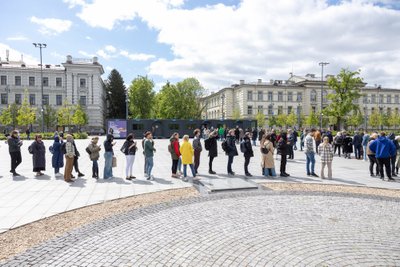
"To be honest, I often feel embarrassment, discomfort, and shame when observing the statements and actions of our politicians, especially during the heightened political turmoil before elections. I understand that Lithuania is not unique in this regard, and overall, our quality of life is quite satisfactory, I simply do not engage into these political games. It’s the twenty-first century, all opinions should be welcomed. Unfortunately, it seems that is not always the case," explained Monika.
Edita also outlined the reasons for lacking willingness to get more involved in important processes.
"I don't think that my attitude is complete indifference to everything happening in our country. I'm not indifferent, because you simply cannot be completely ignorant. It seems to me that I have some choice, my personality is still developing, my views and perspective continue to develop, I consciously choose refraining from delving into politics for now. I would like to emphasise – for now," she reflected.
However, not all young individuals of the same generation share the same views. Some young people deeply care about their civic responsibilities and their own rights.
“I think the saying that young people are the future of our country is more than not just a popular catchphrase. It is very logical. We cannot rely on our parents or grandparents to always make the right choices in elections, we cannot expect them to think exactly the way we do. Eventually, we will responsible for everything. What will we do then?" rhetorically asked Austėja (name changed).
According to the girl, this opinion is not particularly popular among her peers.
“I’m certainly not a perfect role model myself, but I am interested in the political processes taking place both in Lithuania and the world, and I don't want to regret my ignorance or start taking care when it is too late. Perhaps I would be even more motivated if there were some like-minded individuals around, but, unfortunately, there are none," Austėja remarked.
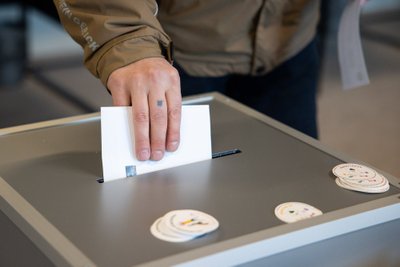
The Notion of Citizenship – What Does it Mean for a Young Person Today?
While there is certainly a sense of indifference among young people towards engaging in the important processes taking place in our country, not all hope is lost. The very fact that young individuals themselves are aware of the negative impact of their apathy on their future is promising.
"I do understand that my vote does matter a lot, and I want my opinion to be heard, without a doubt. Perhaps I would appreciate some mentorship, encouragement from the outside to trust my voice. I hear the same sentiment from other young people: sometimes, we lack confidence in our choices. We are still learning to distinguish right and wrong. If we are not actively interested ourselves, nobody is forming that right attitude for us. Well, I don’t know if someone really has to help us with that, but it seems to me that someone should instil these values – the values of citizenship, of patriotism – already at school, or at least within the family. I didn't have that. I have always been interested in other things," admitted Monika.
And Edita agreed.
“I don't know, it seems to me that the young generation has a rather peculiar attitude towards concepts like citizenship, patriotism, and civic duty. Maybe we fail to understand their importance. For example, for me, when I see a young person who is actively engaged in some civic initiatives, activities, who speaks out loud about very important matters, I am kind of surprised. I admire people like that. Should not it be a norm, not the exception? I think it should,” she shared.

However, Edita acknowledged understanding that it is not up to someone else, but to her.
“Well, I guess I have to evaluate for myself how I prefer to live my life, what is important to me, what kind of future I dream about. It's like with everything. If you want to feel good in your body, eat healthy, be physically active, get enough sleep. If you want to live in a country where you feel good and safe, do the same. Talk about what matters, raise important issues. You can start with small things. I do understand that, but maybe I do not yet appreciate how much it means," said Edita.
Young Austėja also shared her thoughts and explained whether she could call herself a good citizen.
"Well, basically, I am a civic-minded person – I take part in elections, I am interested in political processes, in significant events happening in our country, and when I have the opportunity, I try to make life in Lithuania better, to make myself and the people around me feel safer, but I think I am still a long way from being a role model of a civic-minded person. I have some inspiring examples, and I try to follow them with my behaviour," said Austėja.
Are We Giving Enough Attention to Civic Education?
For patriotism and various civic activities to become significant parts of an individual’s life, they need to be nurtured from early childhood. However, as young people themselves pointed out, sometimes these essential values do not get proper attention, at least at school. “My Impact” consulted sociologist, doctor Rūta Žiliukaitė to understand situation better and hear from the experts what they observe.
"I would say that civic education receives attention. It would be incorrect to suggest otherwise. There are civic education subjects in the general education system, and a considerable amount of work is being done through schools – both in dedicated classes and through organized activities,” explained Žiliukaitė.
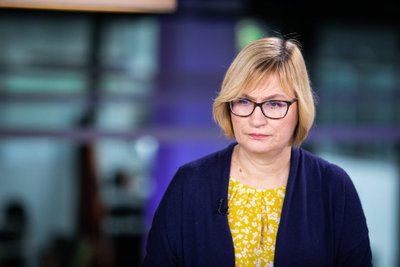
Furthermore, various youth organisations also play a pivotal role in promoting these values.
"There are numerous youth organisations trying to involve young people more actively, offering activities that appeal to them. It is their initiatives and cohesion that has brought a real change in youth participation, including voter turnout," she emphasized.
However, there is still room for improvement, according to the sociologist.
"There is warranted criticism too. In the context of the Civic Empowerment Index, students or teachers are occasionally surveyed. The last survey revealed students’ dissatisfaction with civic education in schools, questioning the subject’s significance. In fact, this topic is worth debate," pointed out Žiliukaitė.
The sociologist also outlined the main issues raised when discussing the quality of civic education.
"How do we train young people to become better citizens? How can we prepare them to be independent citizens of their own country? There is always the question – who should teach this? Who will be responsible for teaching civic education? Here, we also have the problem that assigning a single teacher to this subject is impossible, because then that teacher will not have the proper workload and will probably have to work more. Who then fulfils this function? Usually, history teachers take over on this role alongside their primary subject, but it is worth discussing the subject’s curriculum and content," elaborated Žiliukaitė.
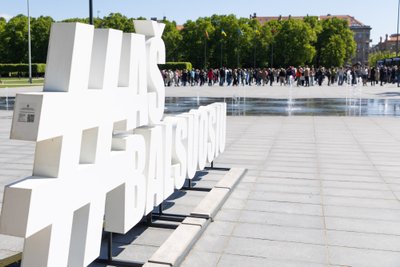
Additionally, according to the sociologist, the information literacy component of Lithuania’s education system remains relatively weak, despite its importance for understanding certain political processes.
"We do not have sufficient emphasis on information literacy, which is very important for young people. In general, it is essential to learn how to gather and asses information critically, because if information comes solely from personal bubbles, from family bubble, it limits choices, decisions, and broader understanding," she concluded.
Why Are Young People Indifferent to Politics?
While efforts are being made to educate young people, and all recent developments in the world seem to be further encouraging youth to take an interest in various political activities and to take care of their own national security, young people, who hold our future in their hands, are rather disengaged from political and democratic processes. Sociologist Žiliukaitė identified some possible reasons and underlying factors.
"This is not just a unique feature of Lithuanian democracy. Globally, it’s noticeable that young people are more passive in elections compared to older citizens. When we look at statistics, we see that the participation of young people is lower, but I would like to stress that, nevertheless, the positive change in the participation of young people is happening. And that positive change is occurring thanks to non-governmental organisations in Lithuania. The efforts that have been made are producing some results," she stated.
According to the sociologist, in order to answer why young people are, nevertheless, a bit more reluctant and hesitant to participate in various democratic processes than other age groups, it is worth considering a number of different factors.
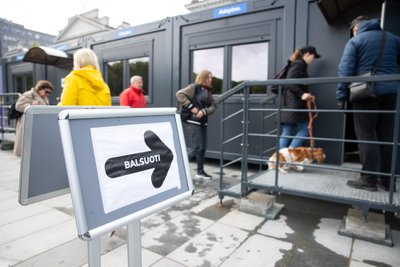
"When we try to understand why people vote or abstain, there is more than a single reason. One of the factors is information literacy. Also, young people are influenced by other factors. The most important thing is to encourage them to participate in elections and understand the process. It may sound too simplistic, but it’s essential: young people need clear, targeted efforts to encourage the first voting experience. If they come to vote for the first time, it is very likely that they continue voting in the future," explained Žiliukaitė.
According to sociologist Žiliukaitė, another crucial aspect is that young people lack social maturity.
"People become interested in politics when it directly affects them, typically it happens in their adult life. Today’s young people start their independent life a little later, when they achieve financial independence, buy a home, or start a family. This transition happens later compared to previous generations. When you are already an adult, but you are still studying, you are still financially and emotionally supported by your family, the period towards full independence extends, making politics less pressing issue," the sociologist explained.
However, according to Žiliukaitė, such young individuals must realize that without youth involvement in politics, there cannot be proper youth policies.
"Numerous issues are relevant specifically to young people. Not older generations, but to young people," stressed the sociologist.
It is also worth thinking about how we want to live in general and what our values are.
"I mentioned youth policy, which is one emphasis, but young people should consider something else – do they value living in a democratic country? If democracy is important for them, they should understand that government in a democratic country is formed through free and competitive elections. Understanding and valuing democracy, they should vote. If democracy is not important for them, that is their choice. If they envision living in an authoritarian state, that is their choice," explained sociologist Žiliukaitė.
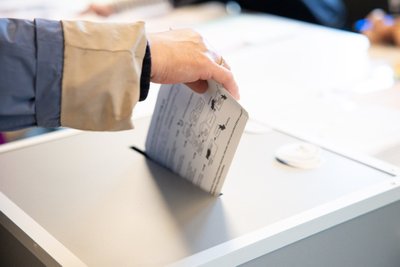
As for the factors contributing to young people's indifference towards politics, Žiliukaitė pointed out another important aspect.
"Young people also lack basic knowledge. If politics is not discussed in their family, if there is no discussion of politics in their surrounding environment, and such phenomenon is quite common in Lithuania, they lack the knowledge needed to make informed choices. They may not know about political parties or political leaders. The political literacy of our young people is relatively low. When asked who is currently the Speaker of the Seimas, or who is currently the head of the Government, or who is the President - many young people struggle to answer, so, how can they make informed decisions?" Žiliukaitė questioned.
Thus, according to the sociologist, today it is crucial to explore ways to reintroduce discussions about politics into the lives of young people. This challenge is common to all democracies,” Žiliukaitė emphasized.
Voting is Just One of Our Civic Duties
Voting and taking part in elections, celebrating national holidays, loving and respecting one’s country – these are just a few aspects of civic duty. Žiliukaitė explained how we should understand the concept of citizenship and how skills necessary for civic engagement are acquired.
"Citizenship still revolves around community, whether it is an imaginary community or a more tangible one within your immediate environment. It fills a void that neither state nor your private life, be it family or work, can completely fulfil. We all have specific needs and interests. Sometimes, to address these needs and interests, we simply need to join forces with others. Young individuals who engage in various informal activities are building their civic skills by learning to collaborate, achieving results collectively," explained the sociologist.
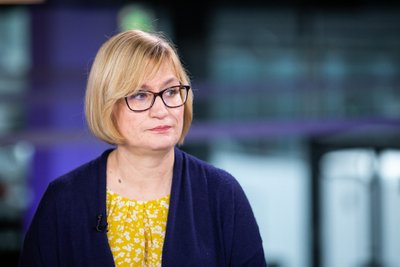
These skills are not a given, she said – they must be cultivated.
"They are acquired through engagement, involvement in different activities – be it sports clubs, some kind of artistic activity, or other pursuits. They may seem to be completely unrelated to politics, but they are significant. They are important because they are developing the capacity to collaborate and achieve common goals," said Žiliukaitė and added that later in life these skills can be used in various other endeavours.
"You can simply try to influence decision-making by organising and mobilising, advocating, and trying to impact various areas. Such young individuals are really active in specific causes, especially when it comes to environmental protection, for example," she shared.
According to the sociologist, a young individual who aspires to be a good citizen should develop strong critical thinking skills and take an interest in public affairs beyond his or her immediate concerns.
"There are various ways in which these vital skills can be developed, but they should be developed," concluded Žiliukaitė.

